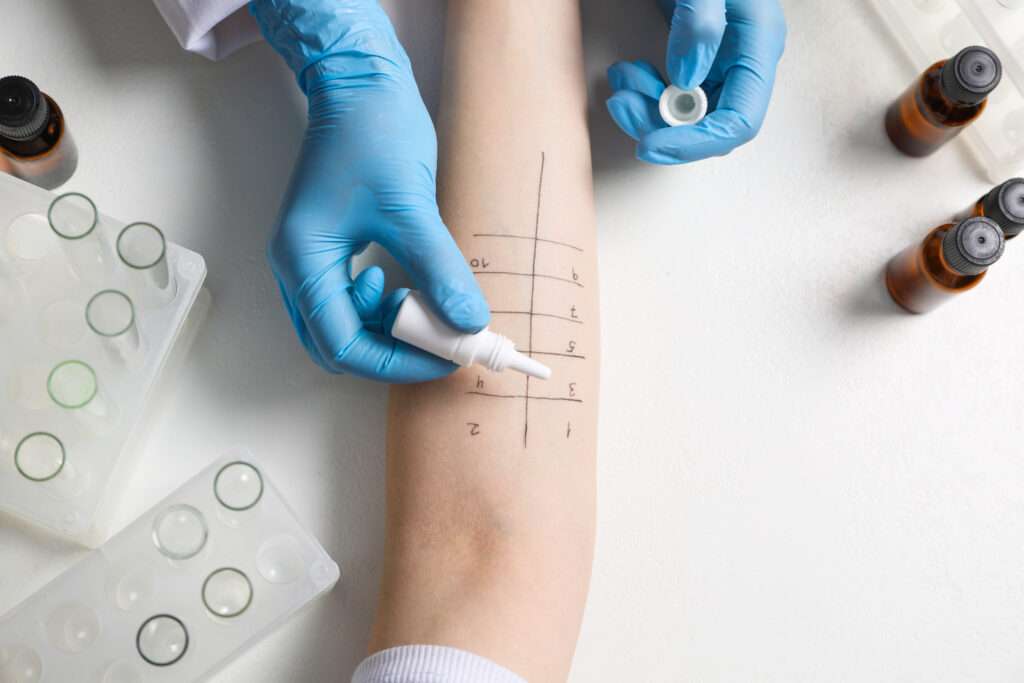How Does Allergy Testing Work and What to Expect
November 26, 2024 2024-11-26 9:21As an Amazon associate, Dermatocare earns from valid purchase made by clicking on the affiliate links in this blog.

How Does Allergy Testing Work and What to Expect
Allergy testing helps accurately determine the cause of allergy symptoms like itchy eyes, skin rashes, or a runny nose. For people struggling with hay fever, food allergies, or severe allergic reactions, identifying specific allergy triggers can significantly improve daily comfort and overall health. Whether it’s pet dander, dust mites, or certain foods causing discomfort, understanding these triggers opens the door to targeted treatments and effective management.
The allergy testing process is more than just a diagnostic tool; it’s a pathway to better living. By identifying allergens, healthcare professionals can create personalized strategies to reduce exposure and alleviate symptoms. With advances in allergy testing techniques, achieving accurate results is now quicker and more accessible than ever, offering relief and clarity to those suffering from allergic reactions.
Read on to learn more about allergy testing and what you can expect on your first appointment.
Understanding the Allergy Testing Process
The allergy testing process is designed to identify allergens, the term used to describe substances that cause allergic reactions. During your visit to an allergy clinic, you’ll undergo a physical exam and share your medical history. This helps determine whether food allergy testing, environmental allergy testing, or other methods are most suitable for your needs.
The two primary types of allergy tests are allergy skin testing and allergy blood tests. Skin testing includes skin prick tests, intradermal skin tests, and patch tests. During testing, the skin is exposed to a small amount of an allergen extract to check for a reaction, such as redness, swelling, or itching. These skin tests are commonly used because they offer accurate results and are relatively quick.
In some cases, an allergy blood test may be recommended. This involves taking a blood sample to measure allergen-specific IgE antibodies in your system. Blood allergy tests are beneficial when skin testing isn’t an option due to severe allergic reactions, sensitive skin, or certain medicines.
What to Expect During Allergy Testing
For skin prick testing, the healthcare professional will apply a small amount of an allergen solution after gently pricing or scratching your skin, typically on your forearm or back. If you’re allergic, you’ll develop a positive reaction, like redness or swelling, at the test site within 15–20 minutes.

Meanwhile, intradermal skin tests involve applying a small quantity of the allergen directly into the dermal layer of the skin. These tests are often used for more precise detection of sensitivity, especially for insect stings or penicillin allergies.
Patch tests, on the other hand, are used to identify skin allergy triggers that result in delayed reactions. This kind of testing involves applying patches with potential allergens to your skin and letting it sit for around 48 hours. This method is commonly used for contact allergies, such as reactions to cosmetics or certain metals.
If you need an allergy blood test, you’ll be submitting a blood sample to analyze your immune system’s response to specific allergens. Blood tests are helpful in identifying food allergies, asthma triggers, and environmental allergies, such as dust mites or pet dander. These tests may take a few days to return allergy test results, but they offer a broader analysis of allergen-specific IgE levels.
Interpreting Your Allergy Test Results
The results of your skin tests or blood tests will guide your allergy specialist in diagnosing and managing your condition. For instance, a positive reaction during skin prick testing or intradermal testing indicates sensitivity to a particular substance. Meanwhile, if you’re diagnosed with a confirmed allergy, your healthcare provider may recommend allergy treatment options, such as:
- Allergy medications: Antihistamines, nasal sprays, or epinephrine
- Immunotherapy: Allergy shots or sublingual tablets
- Lifestyle adjustments: Avoid allergy triggers like dust mites, certain foods, or insect venom.
In certain situations, an oral food challenge may be performed to verify food allergies. This procedure entails ingesting minimal quantities of the suspected allergen while under medical supervision, mainly when there is a potential risk of anaphylactic shock.
Tips for Allergy Testing Success
Here are some practical tips to help you get ready for your appointment and navigate the testing process effectively:
1. Follow Pre-Test Instructions
Your doctor may advise you to stop taking certain medicines, such as antihistamines, a few days before your test. These medications may inhibit allergic responses and affect the outcomes of skin prick tests or intradermal skin tests. Adhering to these guidelines will ensure the most accurate results possible.
2. Communicate Allergy Symptoms Clearly
Prepare a comprehensive account of your symptoms that you can share with your healthcare provider. Whether you experience itchy skin, a runny nose, abdominal pain, or severe allergic reactions, sharing this information helps identify possible allergens and determine the most appropriate test for you.
3. Dress Comfortably
Since some allergy skin tests may require testing on your forearm or back, wearing loose-fitting clothing can make the process smoother. You’ll also want to dress in layers if you’ll be at the clinic for an extended time during tests like patch testing.
4. Plan for Possible Reactions
Allergy tests are typically considered safe. However, minor side effects may occur, such as itchiness, redness, or swelling in the area tested. To manage discomfort, allocate time for aftercare and bring a soothing lotion or an over-the-counter antihistamine (if permitted).
5. Bring a List of Medications
List all medications, supplements, or over-the-counter remedies you’re taking and inform your healthcare provider about them. This ensures they can advise on any interactions that might affect your allergy test results.
6. Stay Relaxed and Hydrated
Anxiety can sometimes amplify physical sensations during the testing process. Staying calm and hydrated can make the experience more comfortable and less stressful.
By following these tips, you’ll be well-prepared for your allergy testing appointment and positioned to get the most out of the experience. Working closely with your healthcare professional ensures you’ll gain a clear understanding of your allergy triggers and can take steps toward effective management.
Conclusion
Allergy testing is a valuable tool for allergy diagnosis, treatment, and management. Whether you’re dealing with asthma, food allergies, or environmental allergies, understanding your allergy triggers can lead to effective allergy treatment and improved well-being. By working with an allergy specialist, you’ll be better equipped to navigate your condition and enjoy life with fewer allergic reactions.
Visit an allergy clinic today to explore your options and take the first step toward lasting relief. relief.
ROUTINE FINDER
Get free dermatologist-recommended regime by choosing your skin or concerns.

FACE

HAIRS

CHILD

BODY




